Bahrain, also known as the Kingdom of Bahrain, is a Middle East island nation in the Persian Gulf.
It is situated between Qatar and Saudi Arabia.
The country is located in one of the primary oil-producing regions in the world but does not possess the same resources.
It is very well known for its verdant groves of date palms.
Other major attractions include beautiful museums and mosques, as well as traditional markets.
But, aside from all of that, you may be wondering if it is worth it to make the move to Bahrain.
In this article, we dig deep to find the top advantages and disadvantages of moving to Bahrain.
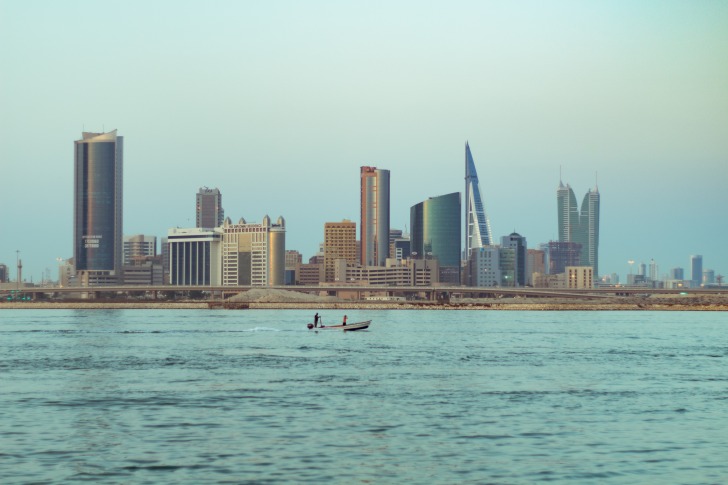
Contents
Pros of Living in Bahrain
1. Crime
Let’s start with one of the primary deciding factors when considering a new country to move to, the crime rate.
According to EList10.com, Bahrain is listed as one of the top five safest countries in the world, along with Singapore, Switzerland, and Hong Kong.
According to the website, violent crime in the country is almost unheard of.
The country attributes these exceptionally low levels of crime to its targeted policing strategy and small size.
Furthermore, the world’s largest user-contributed database, the country has exceptionally low crime levels.
The site states that the country has a safety index of 76.01 and a crime index of 23.99.
It is both safe to walk around alone during the day and at night in this country.
If safety and security are your number one priority for you and your family, then Bahrain delivers!
2. A modern city
Bahrain has been unofficially dubbed as the most modern and cosmopolitan city in the Gulf States.
Though it has long been a trade hub linking trade routes and attracting travelers from all four corners, it was the discovery of crude oil somewhere in the 1930s that helped to uplift the country and its economy and helped to modernize it.
However, it was through economic reforms that the country transformed itself into a business hub.
The 2010 Heritage Foundation/Wall Street Journal Index of Economic Freedom highlighted that the country was the 13th freest country economically and the freest in the Middle East as it allows 100 foreign ownership of businesses without the need for local participation.
But it is a fact that it is considered to be one of the most tolerant countries in the Middle East with an ethnically and religiously diverse population.
3. English
While Arabic is the official language of the island nation, English is still widely spoken.
You should be able to easily communicate with the locals in major cities and more rural areas.
The language is used in business and is a compulsory second language in local schools from kindergarten.
The fact that such a large portion of the current population speaks English is due to ex-pats that have settled in the country.
All public announcements and signs are in Arabic and English.
4. Education
Bahrain follows a three-phase model in their education system which starts at the age of six.
Education in Bahrain is compulsory, free, and world-class.
The education system supplies transportation, supplies, meals, and uniforms.
Regardless of these benefits, there is a 25% dropout rate in middle school.
Education starts with kindergarten, primary school, and middle school, which lasts for three years, and secondary school, which also lasts for three years.
The government is committed to adult education.
As such, nearly 50 vocational schools have been established where adults can acquire nearly any skill.
In addition, the country boasts an impressive tertiary education system.
5. Healthcare
Healthcare in Bahrain is excellent but expensive if you do not have insurance.
Healthcare in the country is considered to be advanced for the region.
The country features a universal healthcare system.
All citizens, regardless of income level, have access to healthcare in the country.
The country offers comprehensive healthcare and has been offering it to citizens since 1960.
Healthcare is free to citizens and non-Bahraini inhabitants receive substantial subsidization.
Bahrain offers three tiers of service: primary, secondary, and tertiary.
Primary healthcare is the first line of defense and consists of 25 healthcare facilities and three clinics.
But, it’s not just the fact that healthcare is accessible to everyone, the technology and quality of healthcare far surpass that of the region.
6. Entertainment
If you enjoy eating out and socializing, then you won’t be disappointed by Bahrain.
The country features a host of local and international cuisines that cater to ex-pats, locals, and those from neighboring countries.
When it comes to entertainment in general, the country has a host of exciting things to do in all regions.
Whether you want to be a tourist while you live here and venture out on one of the many tours offered, visit local mosques and museums, go to a world-class waterpark, visit an ancient site, or simply go shopping in one of the major malls, there will be an activity to cater to your needs.
7. Cost of living
The cost of living in Bahrain is relatively low compared to the United States.
The site goes on to explain that the cost of living is 27.1% lower than in the United States and rent is, on average, 46.2% lower in Bahrain than in the US.
A meal at an inexpensive restaurant will cost you around $6, while a domestic beer will cost around $8, and an imported beer around $11.
Utilities are under $200 a month and a three-bedroom apartment in the city center will cost around $1,200 per month.
In addition, all substantial commodities are subsidized by the government.
8. Housing
The Kingdom of Bahrain offers diverse housing options and excellent prices compared to other states in the area.
In addition, housing is very accessible to people of all income groups.
The sector’s regulations that govern the framework of the housing industry consider all contracting parties’ rights and aim to protect everyone in the contract.
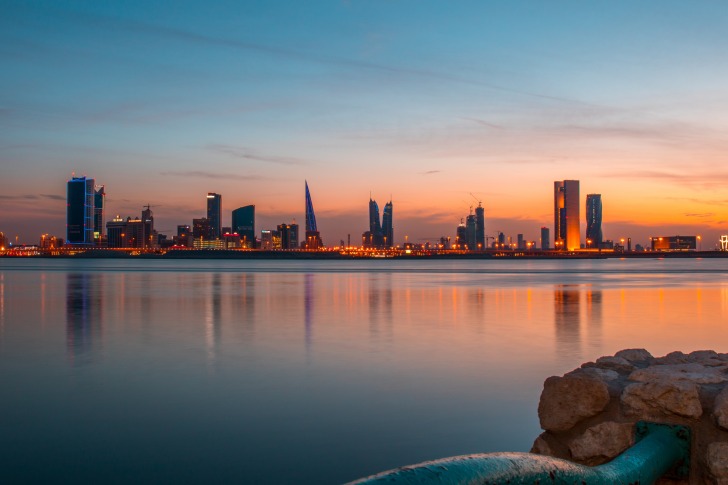
Cons of Living in Bahrain
1. Challenging working environments
In some situations, you may find yourself in a difficult work situation.
This isn’t everywhere.
It will depend on where you work and what type of work you do.
In western culture, work includes standard operating procedures and most things are set in stone once the contract has been signed.
For example, if the contract states that the pay date is on the 25th of each month, then you can expect your salary on that date every month.
In Bahrain, on the other hand, there have been a few complaints from several ex-pats that things don’t always work the same way.
For example, it isn’t uncommon to be paid a salary late.
Your contract may state the 30th of each month, but you may only receive your salary on the 7th of the following month.
There is a colloquial saying in Bahrain: inshallah.
Locals often say it to deflect when there is hope that something will happen but it may also not.
For example, a resident may state, “I hope I get my wifi setup this week”, to which someone may reply with, “inshallah “.
It is used when someone is late to arrive, for example.
This is an indication of how ingrained this is in the culture.
There is even a saying for it.
2. Driving
Driving in Bahrain can simply be described as downright dangerous.
Drivers often make illegal turns without signaling or changing lanes without giving due notice to other drivers on the road.
This is especially concerning over the weekend when locals from neighboring countries enter the island and start drinking.
They may often drive drunk and this makes for a very bad combination.
In addition, the influx of people tends to make the roads much more congested.
In Bahrain, it also isn’t uncommon for someone to drive to the curb as well.
Driving in Bahrain over the weekend is anxiety-inducing and most people avoid doing so out of fear of causing an accident.
3. High cost of utilities
Ex-pats tend to pay more for electricity and water in Bahrain, compared to locals.
The truth is that ex-pats pay on average a staggering 866% more for utilities compared to locals.
There have been talks that the government was taking into account changing or lowering the tariff for ex-pats as foreigners were struggling to keep up with payments.
4. Flights out are expensive
Irrespective of its location, it is quite expensive to catch a flight out of Bahrain.
If you are an ex-pat that enjoys traveling or you would like to catch a flight to any of the neighboring countries, you are certainly going to have to dig deep into your pockets.
One speculated reason for the higher fees on flights is the fact that Bahrain operates a smaller airport and that there are generally fewer people traveling in and out of the island, which may be a reason that the prices have been pushed higher.
5. Coins
This is more of a daily irritant than a con, but here goes.
Bahrain uses coins as part of its monetary system.
There are five, ten, twenty-five, fifty, and a hundred fil coins.
All of the coins are exchanged and used except the five and ten fil.
These coins are frequently handed out when change is given to a client or shopper, but no one wants to accept these coins as a form of payment.
The con is that after a while of collecting these types of coins, you’ll be left with a currency that you can do nothing with, as no one wants to accept these coins.
6. Postal delivery
Receiving anything from friends and family abroad via post is a challenge.
Many residents and ex-pats have talked about the fact that it is simply a nightmare to deal with the postal service and getting anything delivered is something that simply doesn’t happen.
This includes everything from ordering anything online to waiting for a bank card to arrive.
You simply have to travel to the establishment, like the bank, to pick up your items.
Pros and Cons of Living in Bahrain – Summary Table
| Pros of Living in Bahrain | Cons of Living in Bahrain |
|---|---|
| 1. Crime | 1. Challenging working environments |
| 2. A modern city | 2. Driving |
| 3. English | 3. High cost of utilities |
| 4. Education | 4. Flights out are expensive |
| 5. Healthcare | 5. Coins |
| 6. Entertainment | 6. Postal delivery |
| 7. Cost of living | |
| 8. Housing |
Bahrain Safety Overview
READ THE FULL REPORT: Bahrain Safety Review
Safety Index:
- OVERALL RISK: LOW
- TRANSPORT & TAXIS RISK: LOW
- PICKPOCKETS RISK: LOW
- NATURAL DISASTERS RISK: LOW
- MUGGING RISK: LOW
- TERRORISM RISK: MEDIUM
- SCAMS RISK: LOW
- WOMEN TRAVELERS RISK: LOW
Frequently Asked Questions
What is the top tourist attraction in Bahrain?
The Bahrain National Museum and Beit Al Quran.
What is the national dish of Bahrain?
Machboos.
A rice dish made with lamb or chicken.
What is the national sport of Bahrain?
Show jumping.
What is the most visited city in Bahrain?
Manama City.
Who is the King of Bahrain?
Hamad bin Isa Al Khalifa.
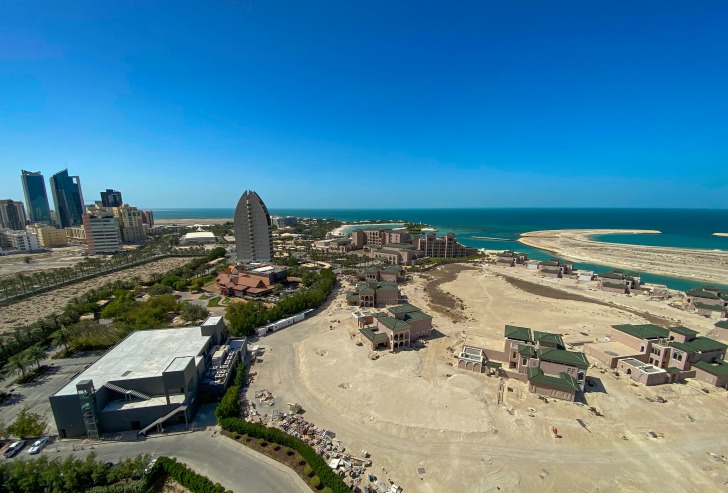
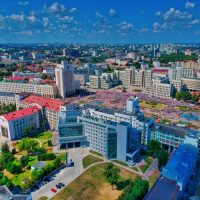




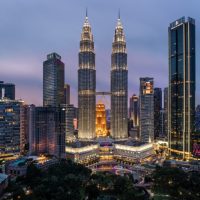





What about freedom of speech in Bahrain? Is it possible to dissgrre with the government or the King?
Not if you want to live 🙂
How is it that the overall safety risk is High yet it is considered one of the top 5 safest countries in the world?